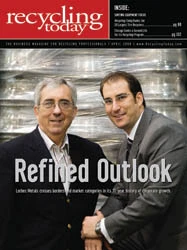Certain apartment and condominium complexes, business and special events in San Diego are required to provide recycling programs as of Feb. 18 under the City Recycling Ordinance, which was passed in November of 2007. The ordinance aims to reduce the amount of waste entering local landfills, meet California’s recycling mandates and reduce greenhouse gas emissions.
The ordinance is being phased in over two years. Recycling requirements for the city’s curbside recycling program customers became effective Jan. 1, 2008. These residences must separate recyclables from trash and put them in the proper receptacles.
As of Feb. 18, apartment and condominium complexes with more than 100 units must provide their tenants recycling of plastic and glass bottles and jars, paper, newspaper, metal containers and cardboard. Additionally, commercial facilities measuring more than 20,000 square feet are required to provide recycling to tenants and employees.
Facilities must have designated areas for recycling containers, and the containers must be labeled appropriately. Owners and property managers must also provide recycling program education to their tenants and employees.
Special events that require a permit from the city of San Diego are also required to provide recycling.
Jan. 1, 2009, the ordinance will be expanded to include apartment and condos with more than 50 units and commercial facilities with more than 10,000 square feet.
Coca-Cola Sets Lofty Goal for RecyclingThe Coca-Cola Co., Atlanta, has announced a long-term target to recycle or reuse 100 percent of the aluminum beverage cans it sells in the U.S. The company had earlier set a goal to recycle or reuse 100 percent of the PET plastic bottles it produced.
"We have made a commitment to ensure the sustainability—and recyclability—of our packaging," Sandy Douglas, president, Coca-Cola North America, says.
"We established Coca-Cola Recycling to help increase recycling rates in North America and to ensure that our system has ready access to recycled material," John Burgess, president and COO, Coca-Cola Recycling (CCR), says. "By the end of 2008, Coca-Cola Recycling will recycle more than 100 million pounds each of PET and aluminum."
CCR has established centralized recycling centers at Coca-Cola’s major production facilities across the country. It also has created collection programs at colleges and universities, office buildings and retail centers, as well as major sporting events, music festivals and other large scale events to drive recycling behavior among consumers.
The National Recycling Coalition (NRC) also honored The Coca-Cola Co. with its annual "Recycling Works!" Award at its 10th Annual Gala ceremony in February. The company was recognized for its commitment to sustainable packaging design, investment in recycling infrastructure and its goal to recycle or reuse 100 percent of its PET plastic bottles in the U.S., according to the NRC.
Tennessee Awards Recycling GrantsTennessee Gov. Phil Bredesen has announced that the state has awarded 20 recycling equipment grants worth $424,000 to various nonprofits, municipalities and public sector agencies. Recycling equipment grants may be used to purchase equipment for new recycling programs, improve and expand an existing site or prepare recyclable materials for transport and marketing. Grants may be awarded to counties, cities, nonprofit recycling organizations and solid waste authorities across Tennessee to help reach or exceed the goals set forth in the state’s Solid Waste Management Act of 1991.
Each recipient is required to match the state grant on a sliding scale basis. Local matching funds toward these 20 projects total nearly $199,000.
The grant program was authorized by the Solid Waste Management Act of 1991 and is supported by the Tennessee Solid Waste Management Fund that is administered by the Department of Environment and Conservation. The fund receives its revenues from a state surcharge on each ton of solid waste disposed in landfills and from a fee on new tires sold in the state.
Grant recipients are:
• Anderson County, $16,380 for a skid-steer loader;
• Cannon County, $17,500 for a box truck;
• Carroll County, $22,130 for a collection truck;
• Claiborne County, $20,000 for compactors and containers;
• Coffee County, $23,960 for a can crusher and roll-off box;
• Dekalb County, $22,650 for divided and open-top containers;
• Fentress County, $25,000 for a box truck;
• Goodwill Industries-Knoxville Inc. of Grainger County, $21,520 for a roll-off trailer, roll-off container and paint;
• Greene County, $7,500 for a vertical baler;
• Hardeman County, $20,000 for a floor-mounted drill press and paint
management;
• Hardin County, $22,680 for containers;
• Henry County, $23,100 for a box truck;
• The city of Lewisburg in Marshall County, $25,000 for carts and a cart
tipper;
• Pickett County, $25,000 for a skid-steer loader;
• Putnam County, $7,980 for a receiver box, canopy and paint management;
• Scott County, $25,000 for a baler;
• Smith County, $24,260 for containers and paint management;
• Van Buren County, $25,000 for roll-off containers;
• Washington County, $25,000 for a fork lift and roll-off containers; and
• Wayne County, $25,000 for a skid-steer loader.
Recycling equipment grants are matching grants up to $25,000. The matching portion of the recycling equipment grant program is from 10 percent to 50 percent and is based on population and economic ability.
Information about Tennessee’s recycling equipment grants and other grant programs is available on the state’s Department of Environment and Conservation Web site at www.tdec.net/swm/grants.
Get curated news on YOUR industry.
Enter your email to receive our newsletters.
Explore the April 2008 Issue
Check out more from this issue and find your next story to read.
Latest from Recycling Today
- Athens Services terminates contract with San Marino, California
- Partners develop specialty response vehicles for LIB fires
- Sonoco cites OCC shortage for price hike in Europe
- British Steel mill’s future up in the air
- Tomra applies GAINnext AI technology to upgrade wrought aluminum scrap
- Redwood Materials partners with Isuzu Commercial Truck
- The push for more supply
- ReMA PSI Chapter adds 7 members





